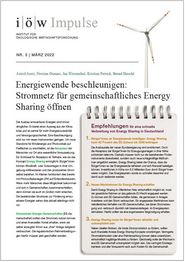Energy Sharing: How citizens can accelerate the energy transition
In his opening statement, Federal Minister of Economics Robert Habeck made it clear that new instruments are needed to expand renewable energies more quickly and achieve Germany's climate goals. The Bündnis Bürgerenergie has provided a proposal with its energy-sharing concept. The Institute for Ecological Economy Research (IÖW) has now investigated the potential of involving citizens in the energy transition through energy sharing. According to the IÖW study, there are suitable locations throughout Germany, so that more than 90 percent of people could join together in "renewable energy communities."
The idea of energy sharing: citizens generate their own wind and solar power regionally, which they use themselves locally within a radius of 25 kilometers. With appropriate political support and adaptation of the market framework, 42 percent of the expansion of renewable energy by 2030 can thus be borne by citizens* according to the current expansion plan for achieving climate targets, according to the study.
"We are currently seeing that the partial lack of acceptance for the expansion of renewable energy plants is becoming a drag," said study author Dr. Astrid Aretz, an energy transition expert at the IÖW. "We are convinced that this can be turned into the opposite: If citizens* can participate in the energy transition themselves, they can become a supporting pillar for the expansion of renewable energies and thus for climate protection. We have calculated that an investment volume of up to 6.5 billion euros could be triggered by citizens implementing energy sharing concepts."
Germany needs to implement European law to promote citizen energy
The existing structures for the promotion of renewable energies do not yet provide for concepts such as energy sharing. Yet there has been a push at the European level since 2018, but Germany has not yet implemented it. "In order for energy sharing to be economically feasible in the public power grid, the legal framework must now be swiftly adapted to the applicable EU law," also demands co-author Jan Wiesenthal. Generation and consumption communities could then be formed to invest jointly in plants. "The communities should receive appropriate compensation if they adjust their consumption in time and space to the fluctuating generation of wind and solar power. The entire energy system would benefit from such grid-serving behavior," Wiesenthal explains.
In a recent policy briefing, the scientists make recommendations for a rapid spread of energy sharing in Germany. Above all, there should be financial incentives to promote energy sharing concepts. Reduced ancillary electricity costs or a premium payment can help promote economically viable models. It should also be straightforward for electricity consumers to switch to a renewable energy community. The policy recommendation was developed as part of a potential analysis commissioned by the Bündnis Bürgerenergie.
~~~~~~~~~~~~~~~~~~~~~~~
Download Policy Briefing:
Astrid Aretz, Nesrine Ouanes, Jan Wiesenthal, Kristian Petrick, Bernd Hirschl: Accelerating the energy transition: opening the power grid for community energy sharing; IÖW-Impulse No. 3, 2022.
(Download PDF, German language)



